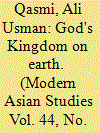| Srl | Item |
| 1 |
ID:
098854


|
|
|
|
|
| Publication |
2010.
|
| Summary/Abstract |
This paper evaluates in detail the policies adopted and the religious ideas held by the power elite of Pakistan during the years from 1947 to 1969. It has been argued that the religious worldview of the power elite was shaped by the discourse of Islamic modernism which allowed envisioning of a state in which (at least theoretically) democracy, rights of minorities, sovereignty of the parliament and flexibility of Islamic laws could be propagated as the guiding principles of the state. Also, by focusing on the life and ideas of Ghulam Ahmad Parvez and by disclosing the details of his close connivance with General Ayyub Khan during the 1960s, the paper will highlight the steps taken to institutionalize Islamic modernism in Pakistan.
|
|
|
|
|
|
|
|
|
|
|
|
|
|
|
|
| 2 |
ID:
166852


|
|
|
|
|
| Summary/Abstract |
The demand for the creation of Pakistan was based on a historical narrative built around the centrality of the Muslim community in India and its distinctiveness in terms of religious beliefs, cultural traits, and historical traditions. A particular understanding of the past was, in other words, central to the idea of Pakistan. As a result, soon after independence in 1947, a group of eminent historians got together to set up the All Pakistan History Conference. It received official support and patronage as the new state was eager to shape a historical narrative that could strengthen the argument for a distinct Muslim identity. This article looks at the development of this historiography in Pakistan. Unlike existing studies on this topic, which simply point out the ‘flaws’ in the history textbooks used in Pakistan, I will argue that the dominant historical narrative to be found in these textbooks—or even in many scholarly works produced in Pakistan—is a form of master narrative that has a longer history that dates back to the colonial period. Drawing upon such sources as historical texts produced in Pakistan, recently declassified documents of the Cabinet Division, and proceedings of the All Pakistan History Conference, I will delineate the features of this master narrative, the intellectual history of ideas that shaped it from the colonial to the post-colonial period, and the political exegesis whereby it gained structural dominance in Pakistan that was replicated for intellectual, ideological, and statist projects.
|
|
|
|
|
|
|
|
|
|
|
|
|
|
|
|